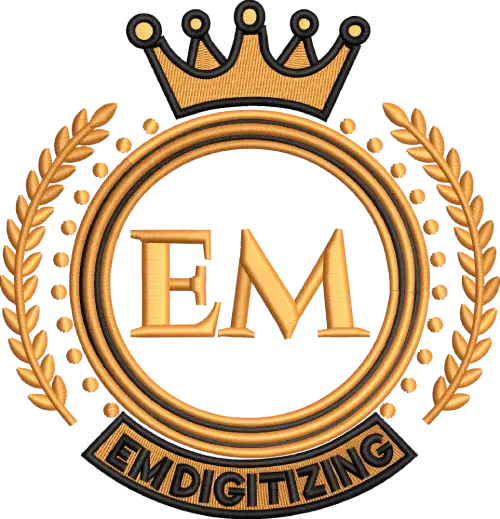Finding the perfect machine embroidery threads can be challenging, especially when each type brings something different to the table. Whether you’re looking for vibrant colors, strong durability, or a specific finish, understanding what each thread offers can make all the difference.
In this guide, we’ll explore key factors like material, thread weight, and compatibility with your fabric and machine. We’ll also share tips to help you avoid frustrating issues like thread breakage.
By knowing what to look for, you’ll be ready to choose threads that make your embroidery projects stand out beautifully and last longer.
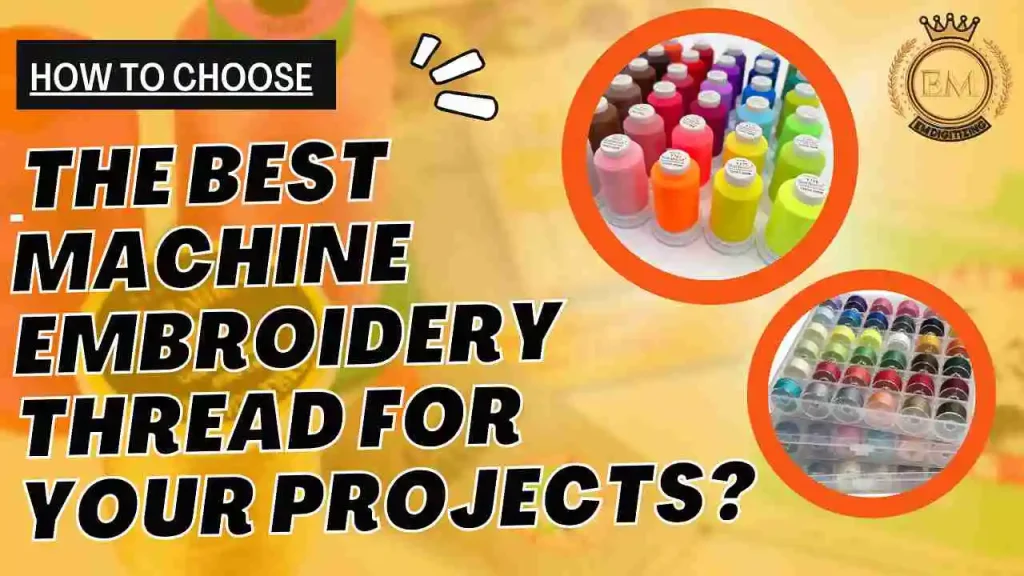
How to Choose the Best Machine Embroidery Thread for Your Projects?
Common Machine Embroidery Thread Types
Understanding the different types of embroidery threads is essential for achieving the right look and durability in your projects. Here are some popular types to consider:
- Polyester Thread
- Rayon Thread
- Cotton Thread
- Silk Thread
- Metallic Thread
- Wool Thread
1. Polyester Thread
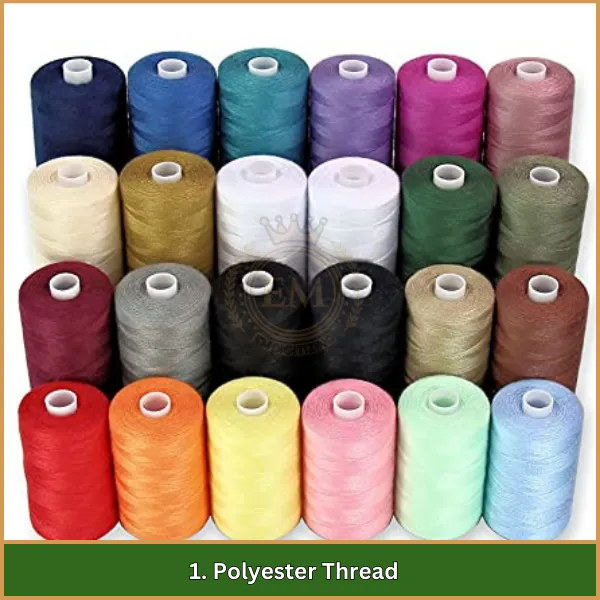
Polyester thread is durable and colorfast, making it ideal for projects that need to withstand frequent washing or outdoor conditions. It has a high sheen and is affordable, making it popular among embroiderers.
Pros
- Strong and resistant to breaking
- Colorfast, even with exposure to sunlight or bleach
- Affordable and widely available
Cons
- Less soft than other threads
- Limited color variety compared to rayon
2. Rayon Thread
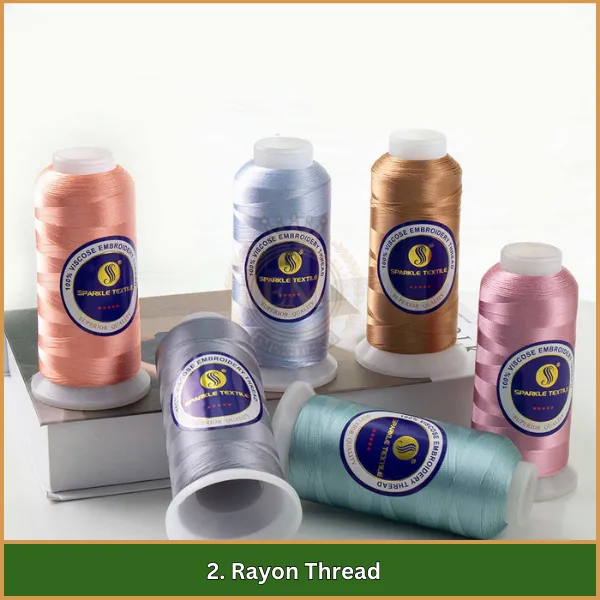
Rayon thread offers a silky, high-sheen finish that brings elegance to designs. It’s softer than polyester, making it a top choice for delicate projects, though it’s less durable for heavy washing.
Pros
- Vibrant colors and luxurious shine
- Soft texture, ideal for intricate designs
- Easy to work with on various fabrics
Cons
- Less durable, especially with frequent washing
- Sensitive to sunlight and bleach, leading to fading
3. Cotton Thread
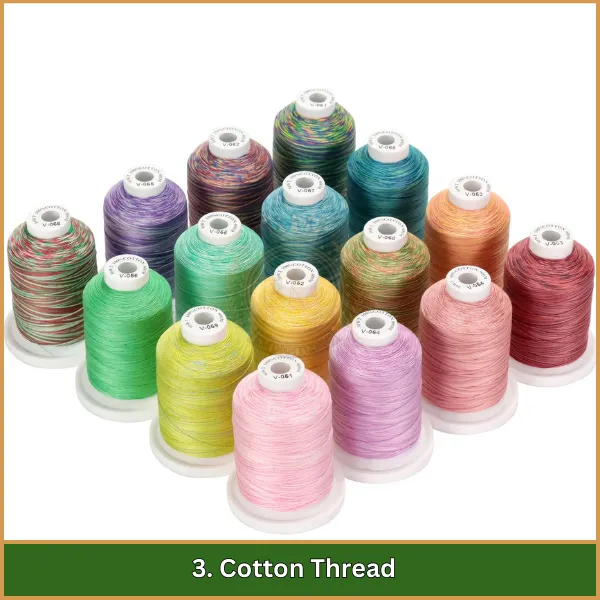
Cotton machine embroidery thread has a natural matte finish and provides a classic look. It’s great for designs requiring a traditional appearance and performs well on natural fabrics like cotton or linen.
Pros
- Natural, eco-friendly material
- Ideal for heirloom and vintage-style projects
- Performs well on natural fabrics
Cons
- Lower strength, more prone to breaking
- Limited sheen, so less vibrant than rayon or polyester
4. Silk Thread
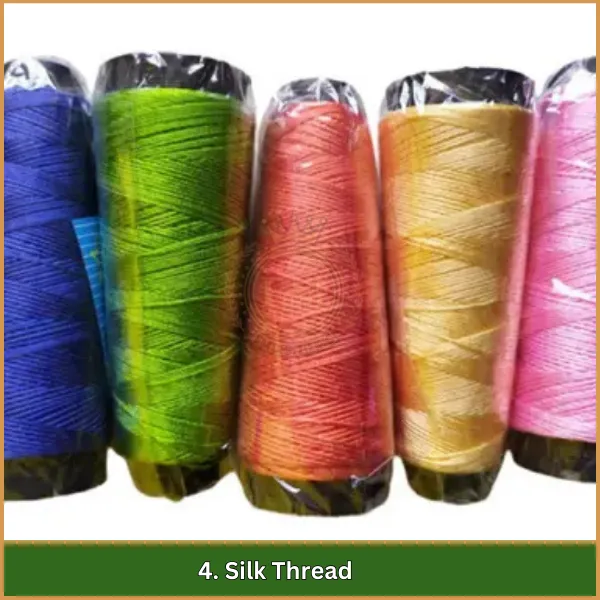
Silk thread brings an unmatched level of elegance with its natural shine. It’s perfect for luxury projects or those requiring a soft, high-quality finish, though it can be expensive.
Pros
- Luxurious sheen and softness
- Excellent color vibrancy
- Works well on delicate fabrics
Cons
- Expensive and harder to find
- Requires careful handling due to its delicacy
5. Metallic Thread
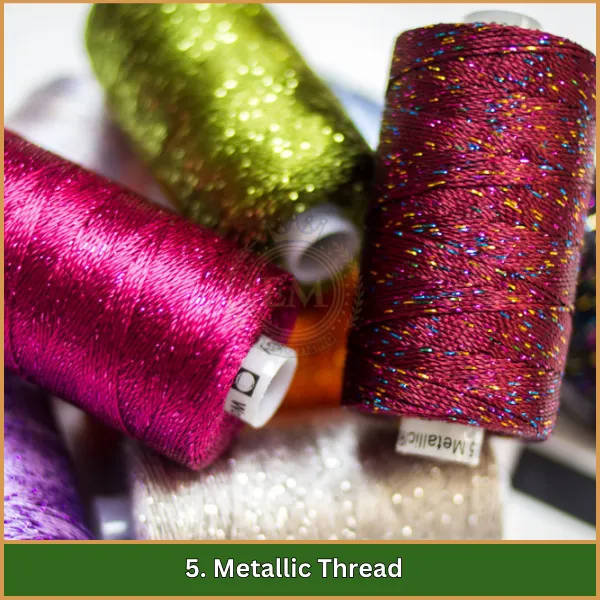
Metallic thread adds sparkle and dimension to designs, perfect for decorative or festive embroidery. However, it can be tricky to work with due to its stiffness and tendency to break.
Pros
- Adds shine and sparkle, great for decorative designs
- Eye-catching and unique finish
- Available in various metallic shades
Cons
- Can be challenging to work with, prone to breakage
- Requires a slower stitching speed to avoid tangling
6. Wool Thread
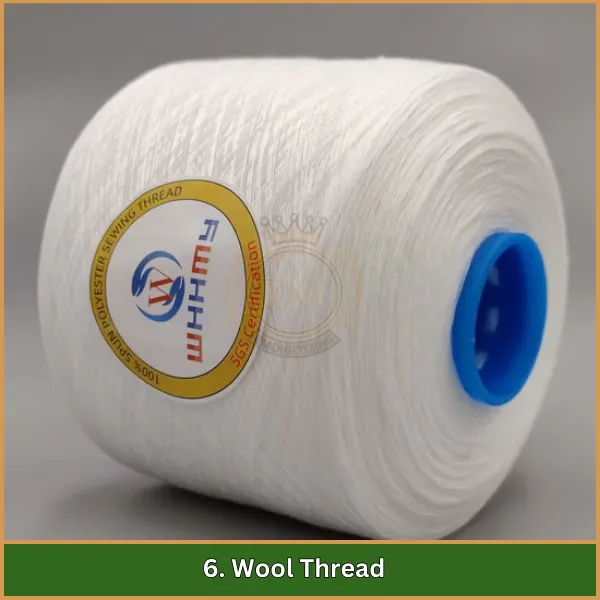
Wool thread has a textured, thicker appearance that adds a rustic, 3D effect to embroidery designs. It’s best suited for projects on heavier fabrics like wool or denim.
Pros
- Adds texture and depth to designs
- Great for rustic or vintage projects
- Ideal for heavier fabrics
Cons
- Limited color options
- Not suitable for detailed, intricate designs
Understanding Thread Weight and Its Importance
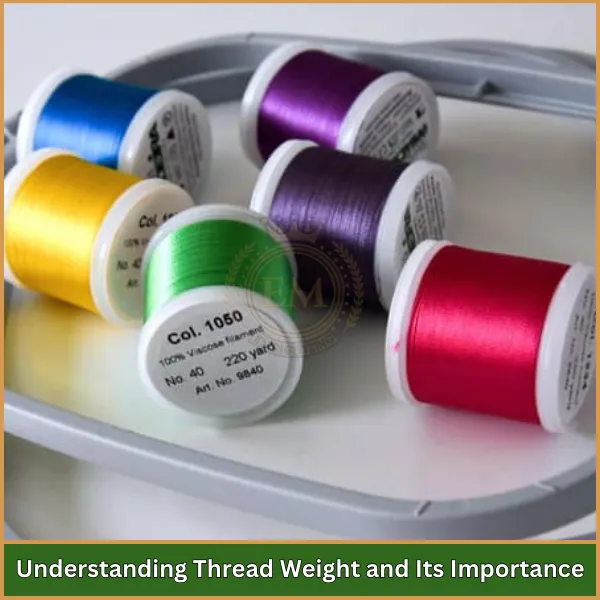
Thread weight is a critical factor in embroidery as it affects the overall look and texture of your design. The weight of a thread indicates its thickness; lower numbers mean thicker threads, while higher numbers mean finer threads. Choosing the right machine embroidery thread weight is essential for achieving the desired detail and coverage in your embroidery projects.
Using thicker threads (lower weight) provides a bold, textured appearance, while finer threads (higher weight) are ideal for intricate details and smooth finishes. Matching thread weight to fabric type and design complexity ensures better results and minimizes issues like thread breakage or uneven stitching.
Thread Weight | Description | Ideal For |
30 wt | Thick thread, bold look | Large designs, heavy fabrics |
40 wt | Standard weight for embroidery | Most embroidery projects |
50 wt | Medium-fine thread | Detailed designs, quilting |
60 wt | Fine thread, subtle details | Small lettering, intricate details |
80 wt | Ultra-fine, delicate | Micro embroidery, fine details on light fabrics |
What is a Bobbin Thread? Why Does it Matter?
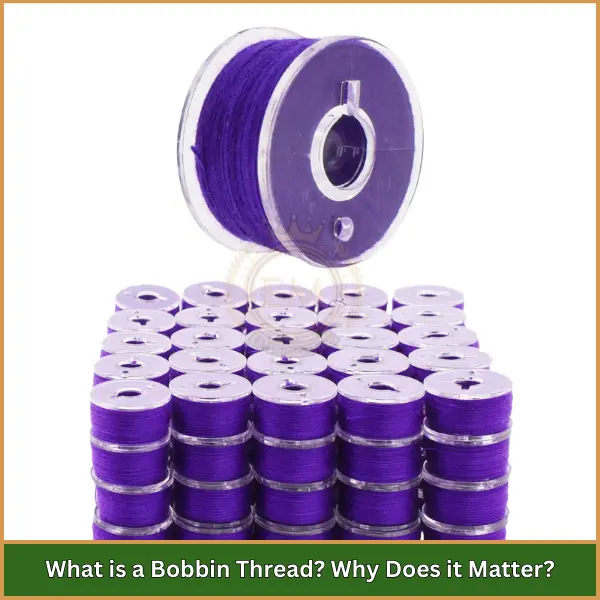
Embroidery bobbin thread is a specialized, lightweight thread that sits in the lower part of an embroidery machine, working with the upper thread to form stitches. Unlike the top thread, which is visible in your design, the bobbin thread stays on the underside of the fabric, providing support and structure to your stitches.
Using the right embroidery bobbin thread is essential because it impacts stitch quality, tension, and the overall appearance of your embroidery. Lightweight bobbin thread reduces bulk on the back of the fabric, creating a smooth, professional finish.
Additionally, it helps prevent issues like thread bunching or uneven stitching, making it a crucial component for achieving high-quality, clean embroidery results.
What is the Best Machine Embroidery Thread Brand We Recommend?
Choosing the best embroidery thread depends on the quality, durability, and color variety you need for your projects. The right brand can make your designs more vibrant and long-lasting, ensuring professional results every time.
- Madeira
- Sulky
- Isacord
- Simthread
- DMC
1. Madeira
Madeira is a high-quality, versatile thread known for its durability and vibrant color options. Madeira embroidery thread is ideal for professional embroidery projects due to its consistent strength and high sheen. This brand offers a wide range of colors, making it suitable for both intricate and bold designs.
Why Choose Madeira?
- Offers both rayon and polyester options
- Excellent colorfastness, even after multiple washes
- Known for smooth stitching with minimal breakage
2. Sulky
Sulky is popular for its high-quality rayon and polyester machine embroidery threads. Sulky embroidery thread is well-suited for decorative embroidery as it delivers a beautiful shine and depth to designs. Sulky’s thread has great strength, making it ideal for machine embroidery that requires durability.
Why Choose Sulky?
- Vibrant colors that last
- Known for silky smooth texture and shine
- Good selection of metallic and specialty threads
3. Isacord
Isacord is a widely trusted brand in the embroidery world, known for its strong, colorfast polyester threads. With a range of over 400 colors, Isacord provides plenty of options for creating vivid designs that withstand frequent laundering and harsh conditions.
Why Choose Isacord?
- Excellent durability and color retention
- Minimal thread breakage, even at high speeds
- Suitable for various types of fabrics and applications
4. Simthread
Simthread is popular for offering quality polyester threads at an affordable price, making it a favorite for both hobbyists and professionals. The brand’s threads have a smooth finish, which minimizes thread breakage and provides a polished look to embroidery projects.
Why Choose Simthread?
- Budget-friendly with good quality
- Available in large packs of various colors
- Consistent thread quality with minimal fraying
5. DMC
Embroidery threads DMC are well-known for their premium quality, especially in hand embroidery. DMC offers both cotton and specialty threads, prized for their vibrant colors and smooth texture. Their cotton embroidery floss is ideal for projects requiring intricate details and high precision, though their threads also perform well in machine embroidery.
Why Choose DMC?
- Wide color range, including subtle shades
- Known for excellent colorfastness and strength
- Perfect for detailed and delicate designs
Conclusion
Selecting the right machine embroidery thread can truly elevate your designs, giving them the vibrancy and durability they need. With the right choice, your projects will look professional and last longer. To help bring your creations to life, EMDigitizing is here to support you with high-quality digitizing services.
We pride ourselves on offering affordable rates, quick turnaround times, and guaranteed quality to ensure your satisfaction. We even provide a preview option so you can see exactly how your design will look.
And if you’re a new customer, you’ll receive an exclusive 50% discount on your first order! Start your journey with EMDigitizing and experience top-tier digitizing like never before.
